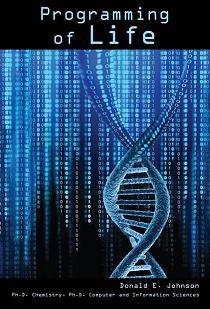 Intelligent Design
Intelligent Design
Darwin-Doubting Scientist Donald Johnson Publishes Book on “Programming of Life”
 Dual-Ph.D. wielding, Darwin-doubting scientist Donald E. Johnson has published another a book on life’s computer-like programming. Titled Programming of Life, the dust jacket reads:
Dual-Ph.D. wielding, Darwin-doubting scientist Donald E. Johnson has published another a book on life’s computer-like programming. Titled Programming of Life, the dust jacket reads:
Each cell of an organism has millions of interacting computers reading and processing digital information, using digital programs and digital codes to communicate and translate information. Life is an intersection of physical science and information science. Both domains are critical for any life to exist, and earth must be investigated using that domain’s principles. Yet most scientists have been attempting to use physical science to explain life’s information domain, a practice which has no scientific justification.
Programming of Life is follow-up to Johnson’s previous book , Probability’s Nature and Nature’s Probability, which gave a well-referenced introduction to intelligent design.
True to Johnson’s form, his latest book is full of helpful introductions to topics like statistics and information theory, chock-full with citations to the mainstream scientific literature. In particular, he cites to a growing body of technical literature of scientists who are skeptical of materialism.
Programming of Life focuses on elucidating the computer-like workings of the cell and their implications for materialism-based theories about life’s origins. To get a snippet from the book, consider the following:
For functional communication (including controls) to occur, both sender and receiver of each communication step must know the communication protocol and how to handle the message. In each cell, there are multiple OSs, multiple programming languages, encoding/ decoding hardware and software, specialized communications systems, error detection and correction mechanisms, specialized input/output channels for organelle control and feedback, and a variety of specialized “devices” to accomplish the tasks of life. The author can attest that these concepts are not trivial since many were fundamental to his second Ph.D. thesis research.
The challenge for an undirected origin of such a cybernetic complex interacting computer system is the need to demonstrate that the rules, laws, and theories that govern electronic computing systems and information don’t apply to the even more complex digital information systems that are in living organisms. Laws of chemistry and physics, which follow exact statistical, thermodynamic, and spacial laws, are totally inadequate for generating complex functional information or those systems that process that information using prescriptive algorithmic information. Unfortunately, most people investigating origins are unfamiliar with the immensity of the problems, and believe that time, chance, and natural selection can accomplish almost anything.
With Ph.D.s in both chemistry and computer & information sciences, Johnson is an ideal person to write about attempts to use computer simulations to support neo-Darwinism. The book contains an astute discussion of the Avida program, which has been claimed by Robert Pennock to show “design without a designer.” Johnson applies his expertise in the following critique:
Although Avida has been cited as evidence against irreducible complexity(a later topic), it is significant that when only the most complex function(EQU) was rewarded, it never appeared even in extremely long simulations. EQU could only form from simpler functions, and when those are assigned no advantage, the complex function doesn’t form. In short, Avida can be used to validate neo-Darwinism only if neo-Darwinism is taken as true (a programmed tautology).
After presenting the evidence, he concludes:
Perhaps the time has come to reevaluate what we know, what we don’t know, what’s unknowable, and what is worth spending our limited resources to attempt to know. The last item is somewhat philosophical, but the others can be addressed as science. There is a need to differentiate what may be productive from speculations that can be operationally falsified [Abe09U]. The response to questioning Darwinism, for example, has often been loss of funding or even jobs. After considering the facts of this book, you can evaluate the accuracy of statements like “Darwin’s theory is now supported by all the available relevant evidence, and its truth is not doubted by any serious modern biologist”. You can evaluate the claim that anyone doubting Darwinism “is ignorant, stupid, or insane”.
Programming of Life is a unique and insightful introduction to the computer-like nature of the cell. It cites from a broad–and growing–body of technical literature of scientists who are skeptical of materialistic explanations for the origin of life. Anyone following this important scientific trend should read this book.
